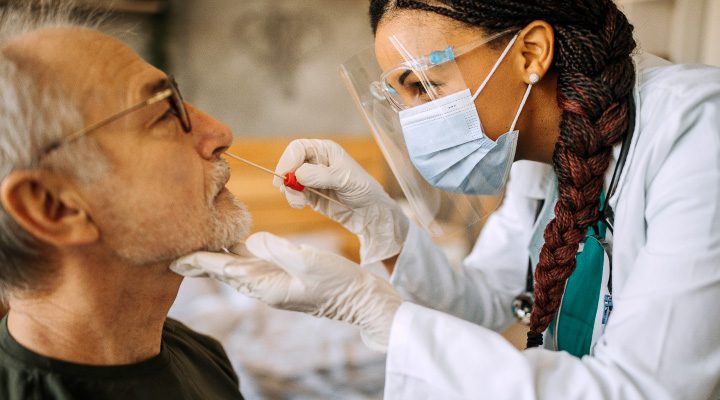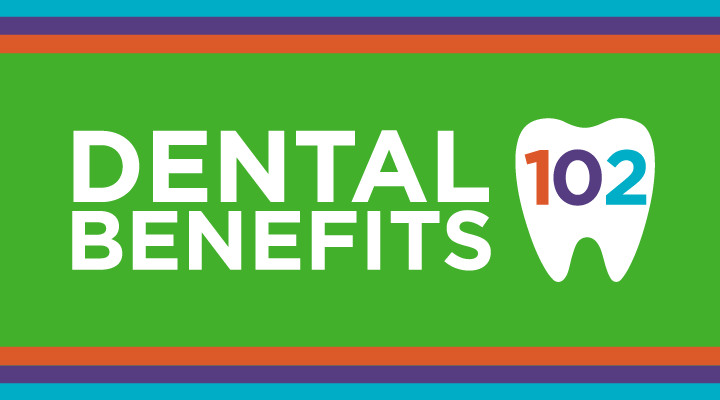How COVID-19 Impacts Oral Health

The pandemic has given us a lot to consider when it comes to COVID-19 and our health. One aspect that you may not be familiar with is how the novel coronavirus impacts oral health.
Individuals who contract the virus, whether asymptomatic or otherwise, have a lot on their mind without considering their oral health. But there’s a trickle-down effect that can cause tooth damage, and the more you know, the more you can protect your oral and overall health.
According to the Centers for Disease Control there are quite a few symptoms of COVID-19, but a cough, sore throat, and shortness of breath in particular can lead to oral health issues or exacerbation of existing problems.
A persistent cough can lead to dry mouth, which on its own can seem insignificant. The trouble with this is that the lack of saliva in the mouth serving as a moistening and cleaning agent prevents cavity-causing bacteria from being washed away. This lack of saliva not only makes it easier for food debris to stay lodged in the teeth, but it also makes us more vulnerable to gum disease.
Dry mouth can also lead to a sore throat or make an existing one worse. Most people use cough drops and syrups to alleviate sore throats and coughs. What many don’t stop to consider is what exactly is in their go-to remedy prior to seeking quick relief. Many cough drops and syrups contain sugar to mask the taste of the medicine. Although this makes them tastier, it also introduces an additional avenue for tooth decay into the mix. When left on teeth, sugar can begin to eat away at the enamel, increasing our risk for cavities.
The good news is that we can mitigate the use of cough drops and syrups by brushing our teeth. If you don’t have time, at least rinse your mouth with water. Many brands produce sugar-free options, which provide the hygiene purpose without the added sugar.
Inhalers are another solution for coughs and shortness of breath. Did you know that failing to clean your mouth after using an inhaler can lead to oral health implications such as oral thrush? Symptoms of oral thrush include an unpleasant taste or even the loss of taste altogether, a burning sensation, redness in your mouth, and even white patches.
Just like with cough drops and syrups, it’s important to brush your teeth after use an inhaler, or at least rinse your mouth with water. This will help remove any leftover medicine.
While none of these oral health implications are life threatening, they can develop into larger issues if left untreated. If you’re still concerned about your oral health after properly handling a coronavirus situation, reach out to your dentist to discuss your health history and options for treatment.
Related stories
-
Swimming Pools and Your Teeth | The Link Between Chlorine and Teeth
It’s no secret that most pools contain chlorine, a chemical used to kill germs. However, you might be … Read More
-
Go Green by Going Paperless
It’s obvious we love the color green, but we view “green” as a verb too. Each … Read More
-
Dental Insurance 102 [INFOGRAPHIC]
Our dental insurance series continues! Once you’ve mastered the basics through our 101 Infographic, you’re ready to … Read More
Sign Up Now
Most Liked
- 1 Do Expiration Dates on Dental Products Matter? 305 Likes
- 2 Is Activated Charcoal Safe for your Smile? 167 Likes
- 3 Crazy and Cool Fish Teeth Facts 92 Likes
- 4 What Are Tonsil Stones? 81 Likes
- 5 Delta Dental Protects Your Eyes with DeltaVision® Coverage 74 Likes
- 6 The In-between Tooth: Guide to Bicuspids 53 Likes
- 7 Recipe: Quick Pumpkin Pudding 49 Likes
- 8 Bad Taste After Brushing? Common Explanations 44 Likes
- 9 People with Dental Benefits are Healthier 40 Likes
- 10 Own Your Oral Health: Subscribe now for tips to ensure a bright smile 39 Likes




